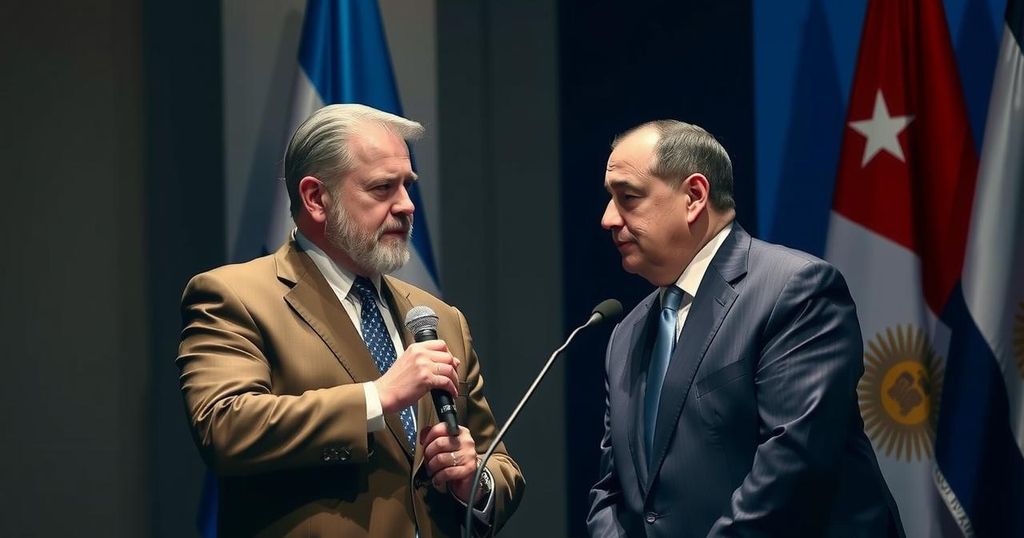Argentina’s President Javier Milei has dismissed Foreign Minister Diana Mondino after the country voted to lift the U.S. embargo on Cuba. This marked Argentina’s first divergence from U.S. and Israeli positions since Milei’s inauguration. Gerardo Werthein has been appointed as her successor, reaffirming Milei’s stance against the Cuban government and emphasizing a foreign policy centered on democratic values and human rights.
President Javier Milei of Argentina has dismissed his Foreign Minister, Diana Mondino, following the nation’s recent vote at the United Nations in favor of lifting the U.S. economic embargo on Cuba. This decision marked a significant shift in Argentina’s foreign policy, as it was the first instance since Milei took office that the country did not align itself with U.S. and Israeli positions regarding Cuba. During a UN session on Wednesday, Argentina joined 187 other nations in supporting a non-binding resolution to end the embargo, which was opposed only by the United States and Israel. In light of this development, Diana Mondino has been replaced by Gerardo Werthein, Argentina’s ambassador to Washington. Following the change, Milei’s administration emphasized its firm stance against the Cuban government, stating that Argentina is “categorically opposed to the Cuban dictatorship.” Under the previous leftist Peronist government, Argentina fostered a close relationship with Cuba, advocating for the termination of the longstanding embargo instituted by the U.S. in the 1960s amid the rise of communism under Fidel Castro. Historically, Cuba has supported Argentina’s claims over the Falkland Islands, a contentious issue stemming from the 1982 war between Argentina and Britain over the territory. In a statement to clarify the rationale behind his foreign policy, President Milei’s office remarked, “The country is going through a period of profound changes and this new stage requires that our diplomatic corps reflect in each decision the values of freedom, sovereignty and individual rights that characterize Western democracies.” The statement further asserted Argentina’s commitment to promoting a foreign policy that condemns regimes guilty of human rights abuses. Tensions had reportedly been rising between President Milei and his foreign ministry over various issues, although Mondino was regarded as instrumental in maintaining Argentina’s international image, often working to ease tensions arising from Milei’s provocative remarks. The U.S. embargo on Cuba, initiated in 1962, aimed to undermine Castro’s socialist regime by encouraging a shift towards capitalism and democracy, yet it has largely failed in achieving its intended outcomes, creating ongoing disputes between Washington and its regional allies.
The dismissal of Foreign Minister Diana Mondino reflects a pivotal change in Argentina’s foreign policy under President Javier Milei. Historically, Argentina maintained a pro-Cuba stance, especially under leftist leadership, which supported the lifting of the U.S. embargo established in the 1960s as a reaction to the Cuban revolution and the ensuing socialist regime. This shift by the Milei administration represents a departure from this precedent, aligning instead with a broader condemnation of authoritarian regimes, particularly regarding human rights issues. The long-standing trade embargo has been a contentious topic in American foreign policy, criticized not only in Latin America but also by various international bodies that call for its end.
In conclusion, President Javier Milei’s decision to terminate Foreign Minister Diana Mondino’s position highlights a significant shift in Argentina’s diplomatic posture, particularly regarding Cuba. This realignment towards a more assertive stance against perceived dictatorship and human rights violations aligns with Milei’s broader policy goals. The reshuffling of the foreign ministry is indicative of Argentina’s evolving role in international relations, seeking to reflect values associated with Western democracies while marking a clear divergence from previous governmental policies.
Original Source: www.bbc.com






